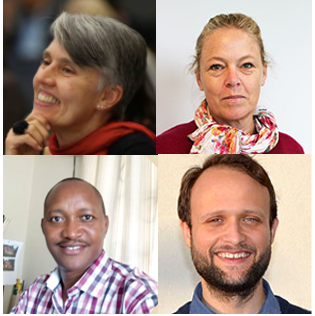Speakers at the climate conversation

In 2021 and 2022, the IPCC will present its sixth assessment report, and SLU takes the launch as an opportunity to discuss the current scientific knowledge about climate change in a series of conversations. 10 March is the next conversation: Impacts, adaptation and vulnerability in a changing climate - How should we adapt food production under climate change? SLU has invited four experts to talk from their point of view.
Dr Debra Roberts
Dr Debra Roberts is currently head of the Sustainable and Resilient City Initiatives Unit in eThekwini Municipality in Durban, South Africa. She was a Lead Author of Chapter 8 (Urban Areas) and a Contributing Author to Chapter 12 (Africa) of the Working Group II contribution to the IPCC Fifth Assessment Report. She was elected as Co-Chair of Working Group II for the IPCC’s Sixth Assessment cycle in 2015. Debra Roberts was also a member of the South African United Nations Framework Convention on Climate Change (UNFCCC) negotiating team until December 2015, and has sat on various international advisory bodies focused on climate change issues in cities.
Debra Roberts will offer an introductory reflection on the IPCC report. She discusses the report's main findings and how the report has been crafted and offers an outlook on its possible uses.
Professor Jennie Barron
Professor Jennie Barron develops, leads and coordinates research, teaching and outreach in national and international contexts within agricultural water management for sustainable intensification of agro-ecological landscapes at SLU. Her research activities aim to deliver evidence-based knowledge for policy and investments for food security, productivity and resilience in an era of climatic and social change, in Sweden and in regions of Sub-Sahara Africa and Asia.
Jennie Barron will give a talk about farmers’ climate change adaptation in Africa, Asia and Sweden and what Sweden can learn from other countries.
Dr Stephen M Mureithi
Stephen M. Mureithi is a Senior Lecturer and a Researcher at the University of Nairobi’s Dept of Land Resource Management and Agricultural Technology, Univ of Nairobi. He is a leading Kenyan scientist in Rangeland Ecology and Management and has extensive knowledge of the East African rangelands and the pastoralist and agro-pastoralist systems. His passion is restoring degraded grazing lands together with the pastoralist and agro-pastoralist communities, and by so doing improving the land productivity, livestock-based livelihoods, habitat for the wildlife, and carbon sequestration at local level.
Currently, Stephen is participating in the implementation of a number of R4D projects in the East African drylands. For instance he is the Country Coordinator for the interdisciplinary project at SLU – Drylands Transform – focusing on improving the productivity of degraded rangelands through co-developing sustainable rangeland restoration and management options with local communities in knowledge sharing hubs (‘Livestock Cafés’) in Kenya and Uganda’s Karamonja Cluster.
Stephen Mureithi will give a current state image of impacts and adaptation of the current drought in East Africa, focusing on the pastoralist-perspective.
Associate Professor Harry Fischer
Associate Professor Harry Fischer’s research explores the intersection between environmental governance, rural development, and democratic politics in the developing world, with a focus on India and Nepal. Some of his ongoing research projects involves “Institutional networks and self-organised adaptation: Tracing the democratic architectures of climate response”, "Impacts of Afforestation on Sustainable Rural Livelihoods in India" and “Planning plantations: Past learning, toward triple wins in carbon, biodiversity and livelihoods”. Fischer has his PhD from the Department of Geography, University of Illinois, USA, and has been a research fellow at the Indian School of Business, Hyderabad, and the Australia-India Institute at the University of Melbourne, before coming to SLU, Uppsala.
Harry Fischer will discuss his ongoing work on social vulnerability and climate adaptation governance in the Himalayas.